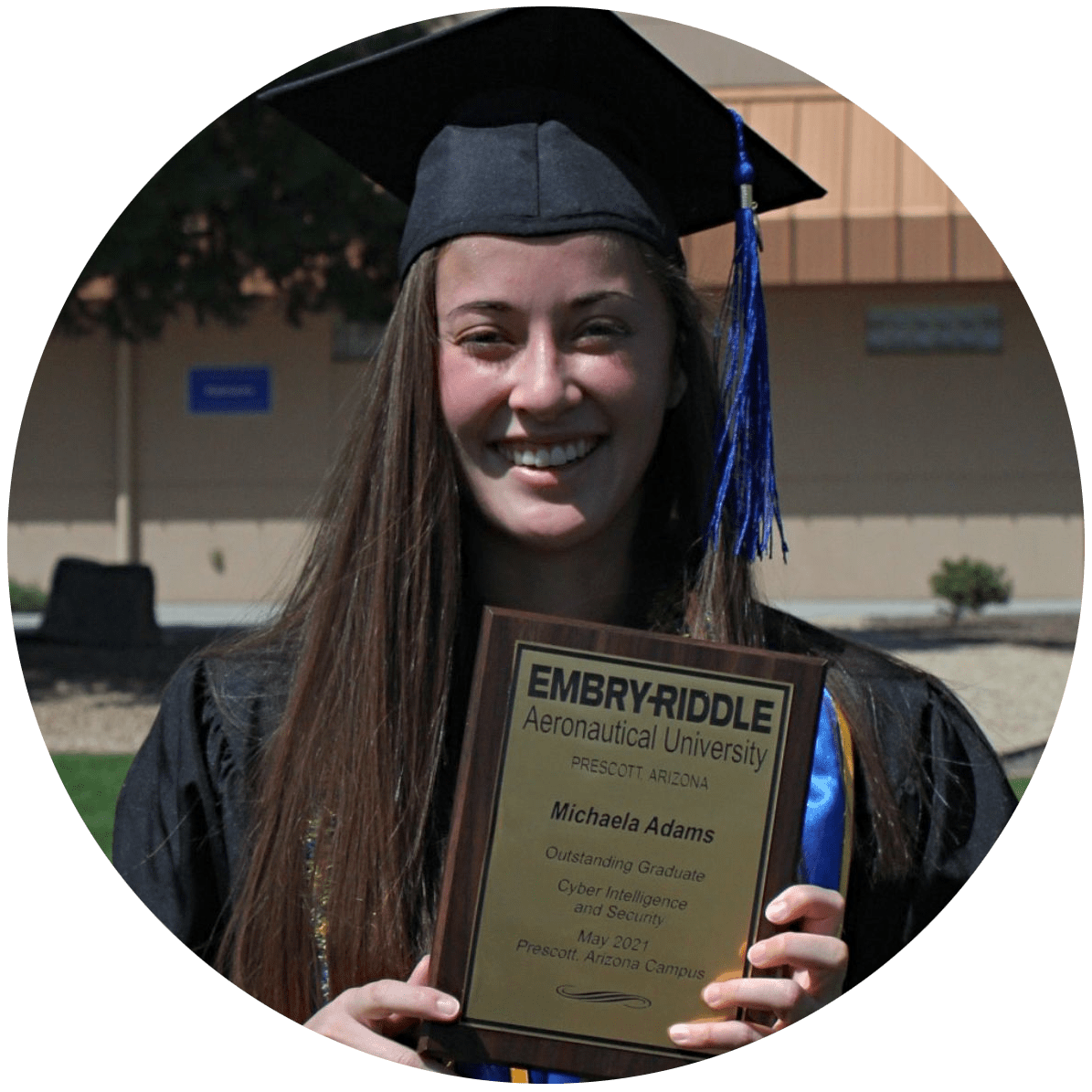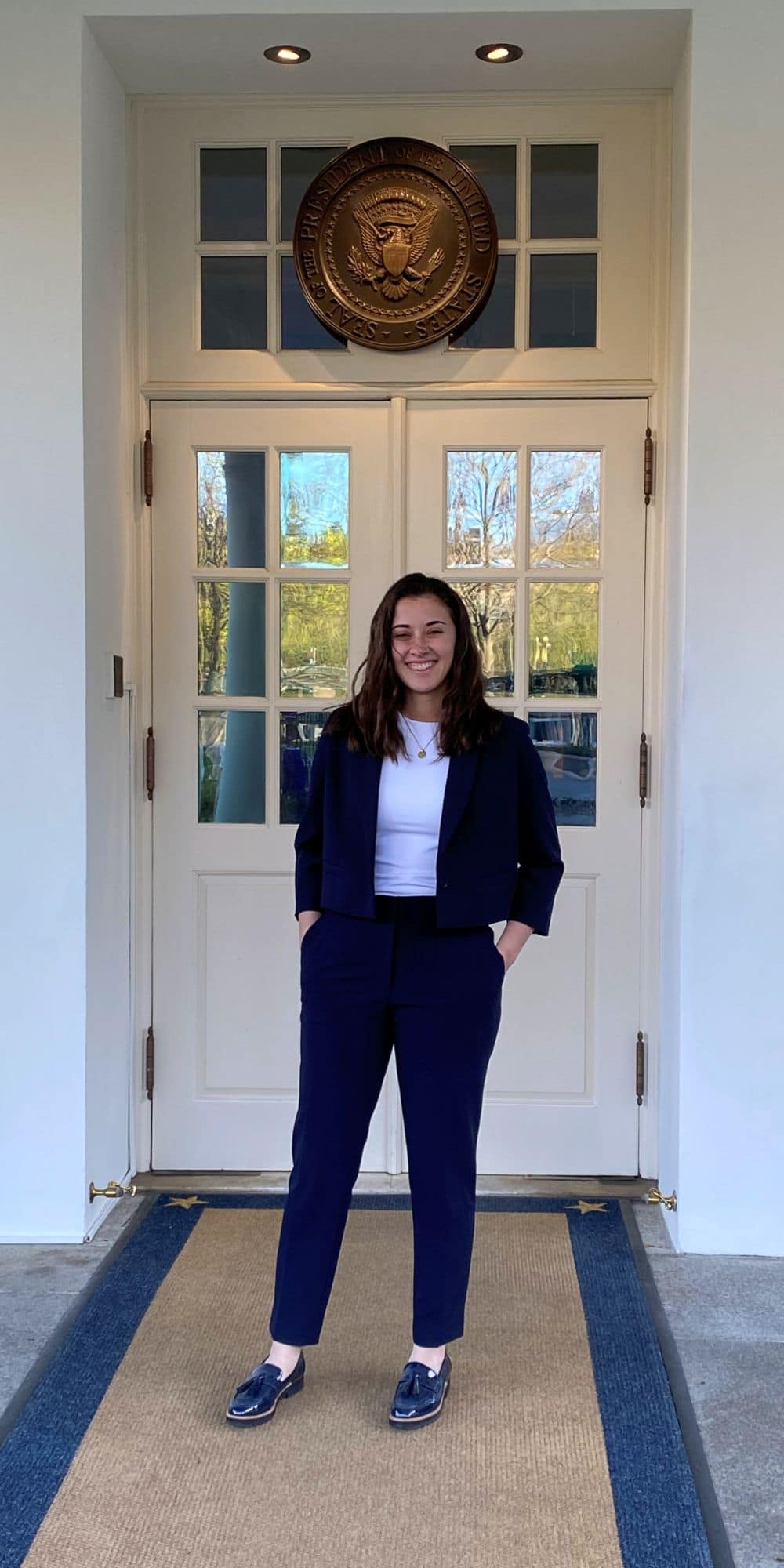Graduate Finds Her Place as a Woman in Cybersecurity
Michaela Adams reveals her path from Cyber Intelligence and Security student to senior cybersecurity engineer at MITRE.

Increasing Women's Role in Cybersecurity
Cyber Intelligence and Security (CIS) alumna Michaela Adams (’21) aspires to be a mentor for young women looking to enter the traditionally male-dominated field of cybersecurity.
“I knew that going into a STEM-related field, I was going to be outnumbered,” said Adams, one of Aviation Week Network's 20 Twenties. “When I started my undergraduate degree in 2017, women represented only 11% of the cybersecurity field. This scared me a bit.”
Embry-Riddle Aeronautical University’s Arizona Campus is home to the nation’s first College of Business, Security and Intelligence, training tomorrow’s leaders in cyber intelligence and security. Adams, who graduated from the program in 2021, credits Embry-Riddle for providing her the confidence to lead in a field that has historically underrepresented women.
“It can be intimidating being the only [woman] in the room, knowing that it is your job to speak out and work harder than anyone else, just to prove that you belong,” she said. “Finding other women and allies in cybersecurity helped me realize that I truly belong, that my voice matters and I can do whatever I set my mind to.”
After graduating from Embry-Riddle, Adams was hired as a cybersecurity engineer at MITRE in Washington D.C. and has recently been promoted to senior cybersecurity engineer where she focuses primarily on threat hunting and detection engineering.
For Adams, the journey to Embry-Riddle started with an interest in computers.
Why choose Embry-Riddle to study cybersecurity?

Michaela Adams was recognized as an Outstanding Graduate in Cyber Intelligence and Security upon her graduation in Spring of 2021. (Photo: Michaela Adams)
Since high school, I always felt a pull toward the STEM world, especially in computers. I took a couple coding classes in high school and the spark ignited.
I remember my sophomore year of high school, I received a letter in the mail about a degree in Cyber Intelligence and Security from a school in Prescott, Arizona. That summer, my family and I drove from California to visit the campus. From that point on, there were no other options. I knew I wanted to pursue my passion while being able to protect people.
Because of the people I met, the resources the college provided and the opportunities for career and professional growth, I knew my journey would thrive.
What is it like being a cybersecurity major?
Starting freshman year, it was terrifying. I moved to a different state, didn’t know anyone and had little knowledge about cybersecurity. Throughout my years in the program, my confidence grew. I pushed myself out of my comfort zone and made lifelong friendships.
I gained skills in multiple areas of cybersecurity, including network security, aviation cybersecurity and malware analysis. Small class sizes allowed me to form beneficial connections with my professors and grow with my peers.
All this contributed to the professional experiences I had, including three internships, three conferences and two certifications. The people, classes and networking all prepared me to be brave, open and confident in the next step of my journey.
What extracurricular activities did you participate in?
I joined multiple groups during my time in school, including the Cyber Defense Club and the Women in Cybersecurity (WiCyS) affiliate. I saw firsthand how people learned from each other, extended opportunities for growth and supported each other in their wins.
One of my most memorable moments was going to my first cyber competition. I competed twice in the Department of Energy’s CyberForce Competition, a two-day competition focused on cyber-physical infrastructure cybersecurity. The competition felt like my first big break and helped me grow confident in my abilities.
Extra curricular involvement helped me learn new skills outside of the classroom and across disciplines. Much of the time, it didn’t feel like extra work but just friends getting together to learn about things we were passionate about.
How did Embry-Riddle prepare you for a career in cybersecurity?
I graduated with a variety of classes under my belt, including ethical hacking, coding, networking fundamentals and intelligence analysis. These fundamentals allowed me to expand and try out different specialties.
One of the greatest growth opportunities I had was in my capstone project. As project manager, I learned how to lead and communicate with our Boeing partners who funded and presented our research to other interested parties, including the International Civil Aviation Organization.
What role does diversity serve in cybersecurity?
In a world as evolving as cyberspace, diversity is critical. Diversity provides different perspectives, skillsets and problem-solving tactics. Adversaries are able to change the game as they develop more sophisticated attacks on civilians, organizations and countries around the world. Defenders would never be able to win the game if we all had the same answers.
The experiences that shape us make each of us unique. This diversity of thought bleeds into cybersecurity — how we solve problems and find areas for collaboration.
How do you find camaraderie with women in the industry?

Michaela Adams touring the West Wing of the White House. (Photo: Michaela Adams)
At Embry-Riddle, I formed friendships and networked at career fairs and conferences. I remember one summer, I had the opportunity to attend Black Hat, an international cybersecurity conference. A few members of the Women in Cybersecurity community suggested getting together for dinner.
I sat at a table with more than 30 women in cybersecurity from different companies, countries and technical specialties. Yet we all shared the experience of being a woman in cybersecurity. Each one gave me their contact information and told me to reach out if I ever wanted to chat.
I left that dinner beaming, knowing that the number at that table needed to grow and wanting to help other women get there.
How to Begin Your Journey in Cybersecurity
Inspiring the next generation of women in cybersecurity is key to growing the field and increasing diversity of thought in threat response. According to Adams, Embry-Riddle provided the encouragement she needed to get to where she wanted to go.
“Embry-Riddle prepared me for my current position by giving me all the tools I needed and the resources to gain more based on what I was interested in,” she said.
Adams’ advice for young women who are interested in cybersecurity is to find their place, regardless of their current skill level.
“For those looking to get into cybersecurity, no matter at what stage in your career, you do belong!”
Embry-Riddle has over 100 degrees available in fields ranging from STEM, security, aviation, engineering and more. Find where you belong at Embry-Riddle and apply today!
Check out our other degrees and programs.
 Previous Story
Previous Story

 by
by


